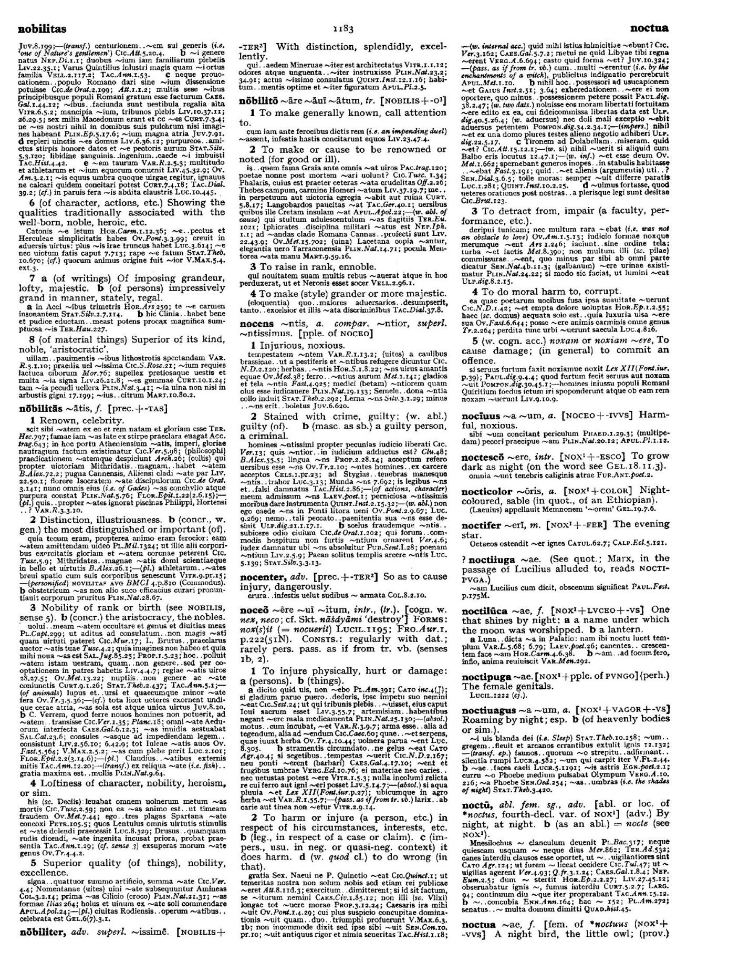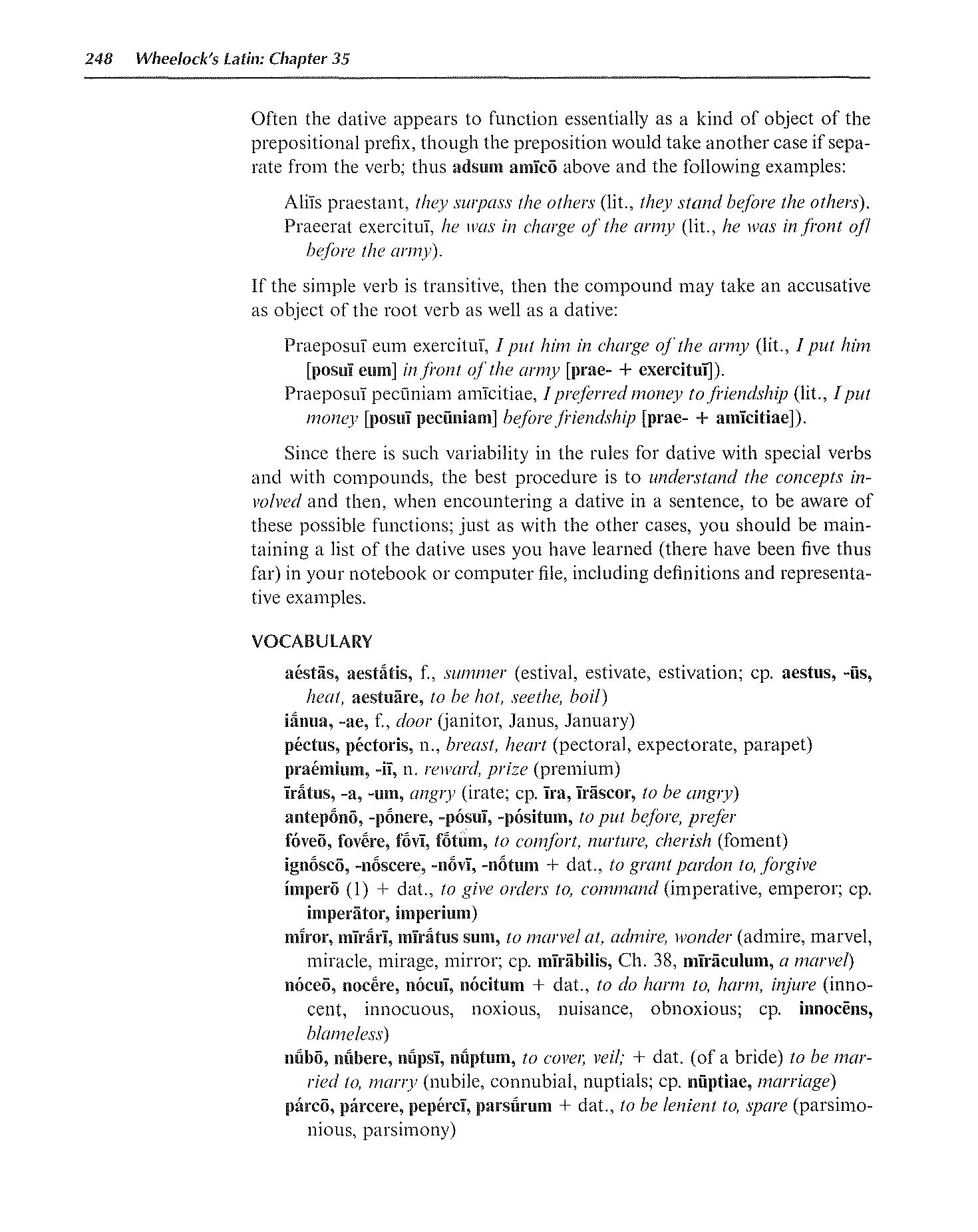
page_listing.tpl
page_subListingDetails.tpl
sub_listingDetails_style1.tpl
sub_listingDetails.title.tpl
nocēre to harm
nocēre is a Latin Verb that primarily means to harm.
Definitions for nocēre
Wheelock's Latin
Verb
- 1
to do harm to, harm, injure
English derivatives:
innocent innocuous noxious nuisance obnoxious
Oxford Latin Dictionary
Verb
- 1
To injure physically, hurt or damage: (a) (persons). (b) (things).
- 2
To harm or injure (a person, etc.) in respect of his circumstances, interests, etc. (b) (leg., in respect of a case or claim). (c) (impers., usu. in neg. or quasi-neg. context) it does harm. (d) (w. quod cl.) to do wrong (in that).
- 3
To detract from, impair (a faculty, performance, etc.).
- 4
To do moral harm to, corrupt.
- 5
(w. cogn. acc.) noxam or noxiam ~ere, To cause damage; (in general) to commit an offence.
Sentences with nocēre
Latin to English
Vir bonus nēminī nocēre vult; omnibus parcit, omnēs iuvat.Compare A good man wishes to harm nobody; he spares all, he helps all.
Nihil metuendum est quod animō nocēre nōn possit.Compare Nothing is to be feared which cannot injure the soul.
Noceō hostibus.Compare I harm the enemy.
Iūstitia numquam nocet cuiquam.Compare Justice never harms anyone.
Conjugation table for nocēre
Cactus2000
| ACTIVE | |
| Indicative present | Indicative imperfect |
| noceō nocēs nocet nocēmus nocētis nocent | nocēbam nocēbās nocēbat nocēbāmus nocēbātis nocēbant |
| Indicative perfect | Indicative pluperfect |
| nocuī nocuistī nocuit nocuimus nocuistis nocuērunt / nocuēre | nocueram nocuerās nocuerat nocuerāmus nocuerātis nocuerant |
| Indicative future | Indicative future perfect |
| nocēbō nocēbis nocēbit nocēbimus nocēbitis nocēbunt | nocuerō nocueris nocuerit nocuerimus nocueritis nocuerint |
| Subjunctive present | Subjunctive imperfect |
| noceam noceās noceat noceāmus noceātis noceant | nocērem nocērēs nocēret nocērēmus nocērētis nocērent |
| Subjunctive perfect | Subjunctive pluperfect |
| nocuerim nocueris nocuerit nocuerimus nocueritis nocuerint | nocuissem nocuissēs nocuisset nocuissēmus nocuissētis nocuissent |
Infinitive present nocēre Infinitive perfect nocuisse Infinitive future nocitūrum esse | Imperative present nocē nocēte Imperative future nocētō nocētō nocētōte nocentō |
| PASSIVE | |
| Indicative present | Indicative imperfect |
| noceor nocēris nocētur nocēmur nocēminī nocentur | nocēbar nocēbāris / nocēbāre nocēbātur nocēbāmur nocēbāminī nocēbantur |
| Indicative perfect | Indicative pluperfect |
| nocitus sum nocitus es nocitus est nocitī sumus nocitī estis nocitī sunt | nocitus eram nocitus erās nocitus erat nocitī erāmus nocitī erātis nocitī erant |
| Indicative future | Indicative future perfect |
| nocēbor nocēberis / nocēbere nocēbitur nocēbimur nocēbiminī nocēbuntur | nocitus erō nocitus eris nocitus erit nocitī erimus nocitī eritis nocitī erunt |
| Subjunctive present | Subjunctive imperfect |
| nocear noceāris / noceāre noceātur noceāmur noceāminī noceantur | nocērer nocērēris / nocērēre nocērētur nocērēmur nocērēminī nocērentur |
| Subjunctive perfect | Subjunctive pluperfect |
| nocitus sim nocitus sīs nocitus sit nocitī sīmus nocitī sītis nocitī sint | nocitus essem nocitus essēs nocitus esset nocitī essēmus nocitī essētis nocitī essent |
Infinitive present nocērī Infinitive perfect nocitum esse Infinitive future nocitum īrī | Imperative present nocēre nocēminī Imperative future nocētor nocētor - nocentor |
| PARTICIPLE | ||
| Participle present active | ||
| Nom. | nocēns | nocentēs |
| Gen. | nocentis | nocentium |
| Dat. | nocentī | nocentibus |
| Acc. | nocentem | nocentēs |
| Abl. | nocente | nocentibus |
| Participle future active | ||
| Nom. | nocitūrus | nocitūrī |
| Gen. | nocitūrī | nocitūrōrum |
| Dat. | nocitūrō | nocitūrīs |
| Acc. | nocitūrum | nocitūrōs |
| Abl. | nocitūrō | nocitūrīs |
| Participle perfect passive | ||
| Nom. | nocitus | nocitī |
| Gen. | nocitī | nocitōrum |
| Dat. | nocitō | nocitīs |
| Acc. | nocitum | nocitōs |
| Abl. | nocitō | nocitīs |
| Gerundive | ||
| Nom. | nocendus | nocendī |
| Gen. | nocendī | nocendōrum |
| Dat. | nocendō | nocendīs |
| Acc. | nocendum | nocendōs |
| Abl. | nocendō | nocendīs |
| Gerund | Supine | |
| Nom. | nocēre | nocitum |
| Gen. | nocendī | nocitū |
| Dat. | nocendō | |
| Acc. | nocendum | |
| Abl. | nocendō | |
Data sources
Notes
- Definitions
- Frederick M. Wheelock, Wheelock's Latin, 6th ed., rev. Richard A. LaFleur (New York, NY: HarperCollins Publishers, 2005): 248.
- P. G. W. Glare, Oxford Latin Dictionary, Vols. 1-8 (Oxford: Clarendon Press, 1982): 1183.
- Word frequencies
- Christopher Francese, "Latin Core Vocabulary," Dickinson College Commentaries, last modified 2014, http://dcc.dickinson.edu.
- Paul B. Diederich, The Frequency of Latin Words and Their Endings, PhD diss., (Columbia University, 1939).
- Louis Delatte, Suzanne Govaerts, Joseph Denooz, and Etienne Evrard, Dictionnaire fréquentiel et index inverse de la langue latine [Frequency Dictionary and Inverse Index of the Latin Language] (Liège, Belgium: Laboratoire d'analyse statistique des langues anciennes de l'Université de Liège [L.A.S.L.A.], 1981): 122.
Bibliography
Allen, Joseph H. Allen and Greenough's New Latin Grammar for Schools and Colleges: Founded on Comparative Grammar. Edited by James B. Greenough, George L. Kittredge, Albert A. Howard, and Benjamin L. D'Ooge. Boston, MA: Ginn & Company, 1903.
Crystal, David. A Dictionary of Linguistics and Phonetics. 6th ed. Oxford, UK: Blackwell Publishing, 2008.
Delatte, Louis, Suzanne Govaerts, Joseph Denooz, and Etienne Evrard. Dictionnaire fréquentiel et index inverse de la langue latine [Frequency Dictionary and Inverse Index of the Latin Language]. Liège, Belgium: Laboratoire d'analyse statistique des langues anciennes de l'Université de Liège (L.A.S.L.A.), 1981.
Diederich, Paul B. The Frequency of Latin Words and Their Endings. PhD diss., Columbia University, 1939.
Francese, Christopher. "Latin Core Vocabulary." Dickinson College Commentaries. Last modified 2014. http://dcc.dickinson.edu/latin-vocabulary-list.
Gildersleeve, Basil L., and Gonzales Lodge. Gildersleeve's Latin Grammar: Third Edition, Revised, and Enlarged. 3rd ed. London, England: Macmillan and Co., 1903.
Glare, Peter G.W. Oxford Latin Dictionary. Vols. 1-8. Oxford, England: Clarendon Press, 1982.
Krüger, Bernd. "Latin Conjugation Tables." Cactus2000. Accessed May 5, 2023. https://latin.cactus2000.de/index.en.php.
Pierson, Nick. "Sound of Text." Accessed October 26, 2019. https://soundoftext.com.
Wheelock, Frederick M. Wheelock's Latin. 6th ed. Revised by Richard A. LaFleur. New York, NY: HarperCollins Publishers, 2005.
Wiktionary Contributors. "Victionarium." Wikimedia Foundation, Inc. Updated March 18, 2019. https://la.wiktionary.org/wiki/Victionarium:Pagina_prima.
Citation
Chicago (17th ed.)
Allo Contributors. "noceō, nocēre, nocuī, nocitum (v.) - Latin Word Definition." Allo Latin Dictionary. Last modified . Accessed February 19, 2026. http://ancientlanguages.org/latin/dictionary/noceo-nocere-nocui-nocitum.
Entry created on . Last updated on .







